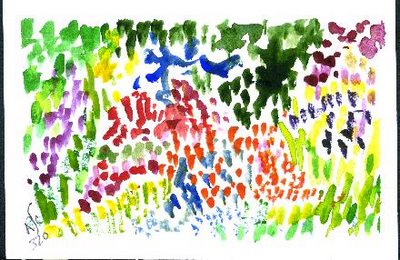
by Elisavietta Ritchie
Additional Advice for a Young Poet
"A writer has nothing to teach and everything
to learn, at all times." Albert Camus
1.
If you have only one paper napkin
for those six empty minutes
cover it with a poem.
Wipe your face
on the other side.
Between the splotches: write.
2.
Lose your pen?
Try a pencil. When this
breaks, wears out,
charcoal till you're black
as the burnt stick
worn to smudge.
Then write with ash
on the sea.
Write on grass.
Try red ink on flames,
blue on the sky,
white on snow.
When all implements
disappear,
use your blood.
3.
If all you have is a paper bag,
not the notebook you always keep
in your pocket, write.
If you shop only at thrifts, still hoard
a closetful to will when you're dead,
better leave poems than rags.
-originally appeared in Confrontation 2006







